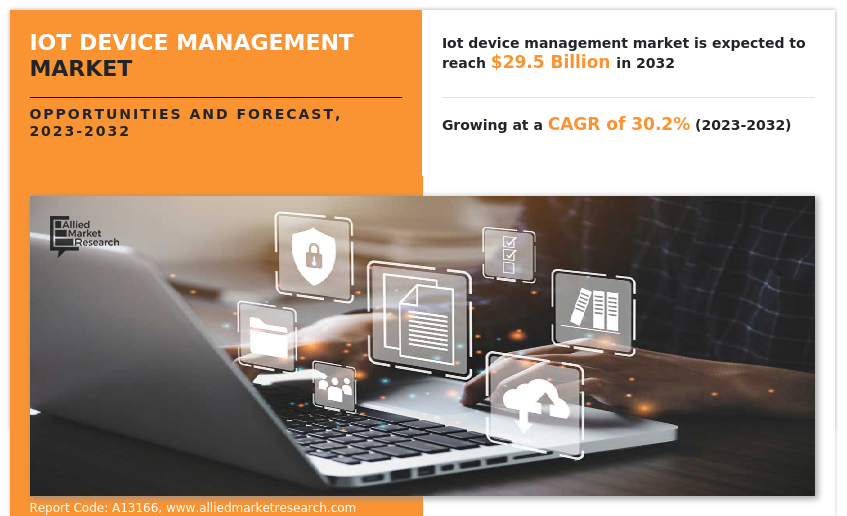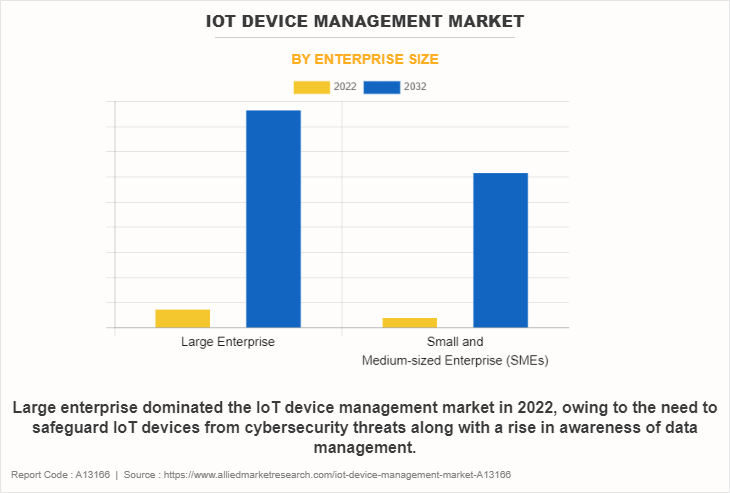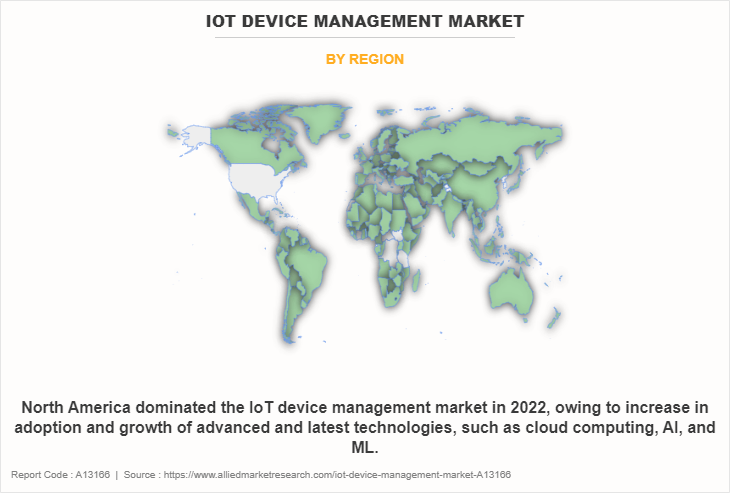IoT Device Management Market Overview
The global IoT device management market was valued at USD 2.2 billion in 2022, and is projected to reach USD 29.5 billion by 2032, growing at a CAGR of 30.2% from 2023 to 2032.
Factors such as the rise in adoption of IoT devices, and growth in need of data security and privacy primarily drive the growth of the market. However, inconsistency in the IoT standards for compatibility hamper market growth to some extent. Moreover, rise in adoption of cloud base devices is expected to provide lucrative opportunities for IoT device management market forecast.

The Internet of Things (IoT) device management market is the area of the technology sector that focuses on managing and controlling IoT devices. IoT devices are actual physical items that have sensors, software, and connection built in them so they can communicate data with other systems and devices. These electronic devices cover a broad range of products, such as connected automobiles, smartwatches, industrial machinery, and smart household appliances. IoT device administration entails the deployment, supervision, configuration, and servicing of these devices over the course of their useful lives. It includes several features such as firmware updates, data analytics, security management, and device troubleshooting. IoT device management seeks to guarantee the efficient and smooth operation of IoT devices.
The rapid expansion of IoT market has fueled demand for IoT device management solutions. There is a need for efficient management and control of linked devices to maximize their performance and guarantee proper operation. Regardless of their size or location, organizations are able to remotely monitor and manage their IoT devices with the help of IoT device management solutions. The presence of multiple vendors offering various solutions and services defines the IoT device management market. Device vendors, software developers, cloud service providers, and system integrators are some of these participants. They provide a variety of solutions, including platforms for device management, connectivity management, and application enablement. New trends and technologies have entered the industry, that have influenced its development. These incorporate the use of blockchain technology for improved security, the adoption of AI and ML for advanced analytics and predictive maintenance, and the move toward edge computing for real-time data processing.
Segment Overview
The IoT device management market is segmented on the basis of component, organization size, end user and region. On the basis of component, it is bifurcated into solution and services. On the basis of enterprise size, it is bifurcated into large enterprise and small and medium-sized enterprise. On the basis of end user, it is fragmented into retail, healthcare, transportation, manufacturing, utilities, and others. On the basis of region, it is analyzed across North America, Europe, Asia-Pacific, and LAMEA.

On the basis of enterprise size, large enterprise segment dominated the IoT device management market growth in 2022 and is expected to maintain its dominance in the upcoming years owing to the need to safeguard IoT devices from cybersecurity threats along with a rise in awareness of data management propels the market growth significantly. However, the small and medium-sized enterprise segment is expected to witness the highest growth, owing to need to implement cost-effective IoT device management solutions, such as risk & compliance, encryption, and incident management drives the adoption of market among small and medium-sized enterprise.

Region wise, North America in 2022 dominating the market and is expected to retain its position during the forecast period, owing to rise in adoption of industry 4.0 and other emerging technologies in varied industry applications has led to a considerable rise in demand for IoT device management solutions for improved digital systems. However, Asia Pacific is expected to witness significant growth during the forecast period, owing to rise in the number of digital transformation initiatives with growth in adoption of advanced technology, such as cloud computing, and data analytics drives the need for IoT device management solutions, particularly in countries such as China, Japan, and India.
The report focuses on growth prospects, restraints, and analysis of the global market trend. The study provides Porter’s five forces analysis to understand the impact of various factors, such as bargaining power of suppliers, competitive intensity of competitors, the threat of new entrants, threat of substitutes, and bargaining power of buyers on the global IoT device management market share.
Top Impacting Factors
Growth in Need of Data Security and Privacy
The quantity of sensitive data that IoT devices collect and transmit has expanded along with the IoT device market. Personal information, financial information, and confidential company information might all be included in this data. Concerns regarding data security and privacy have increased as a result of the potential threats related to data breaches and unauthorized access. IoT device management solutions play a significant role in resolving these concerns by offering strong security measures. For the protection of the data acquired by IoT devices, these systems provide features such as authentication, access control, and encryption. Organizations reduce the risks related to IoT device deployments by establishing these security measures in effect, protecting the confidentiality, integrity, and availability of their data. Compliance with laws and standards is another factor which influences the IoT device management industry in terms of data security and privacy. Sensitive data is protected by a number of laws and standards that are relevant to certain industries, including healthcare and finance.
The capabilities that enable data encryption, safe data storage, and access control are provided by IoT device management systems, which assist organizations in meeting these compliance standards. In addition, organizations prevent fines and reputational harm by making sure regulations are followed. The demand for IoT device management solutions that can successfully protect the data acquired by IoT devices is on the rise due to the increase in need for data security and privacy, which is driven by both potential hazards and regulatory requirements.
Rise in Adoption of IoT Devices
The market for IoT device management is primarily driven by the growth in usage of IoT devices. IoT devices have increasingly been adopted by businesses across a range of sectors to increase operational efficiency, decision-making, and the ability to launch new business models. Applications involving remote monitoring, asset tracking, predictive maintenance, and real-time data analytics make use of these devices. It can be difficult and complicated to manage a big number of IoT devices, especially when it comes to connectivity, security, and software upgrades. IoT device management solutions become useful in this situation. The centralized control and management capabilities offered by these systems enable businesses to effectively manage, monitor, and upgrade their IoT devices. The demand for IoT device management solutions is increased by ability to scale IoT deployments of these solutions, enhance device performance, and cut operational expenses for businesses. In addition, as IoT devices become more widely used, there is a greater requirement for interoperability and seamless communication.
IoT devices frequently use several communication protocols and technologies while operating in heterogeneous contexts. IoT device management solutions assist in addressing this difficulty by offering connectivity management capabilities that facilitate seamless integration and interoperability between various devices and platforms. These solutions guarantee that devices may interact with one another, exchange data, and communicate properly. The need for IoT device management solutions is fueled by the necessity for organizations to be able to manage and optimize connection across a wide variety of IoT devices in order to fully utilize the benefits of their IoT deployments.
Key Market Players
The global IoT device management industry is dominated by key players such as Microsoft Corporation, Oracle Corporation, International Business Machines Corporation, Ptc, Inc., Telit, Smith Micro Software, Inc., Aeris, Advantech Co., Ltd., Enhanced Telecommunications, Bosch.Io Gmbh. These players have adopted various strategies to increase their market penetration and strengthen their position in the IoT device management industry.
Regional Insights
The IoT Device Management Market is seeing notable growth across various regions, with significant differences in adoption rates and industry-specific applications. North America holds a dominant position, driven by the region's early adoption of IoT technologies, robust IT infrastructure, and the presence of leading IoT service providers. The U.S., in particular, is a major contributor, with IoT being heavily integrated into industries such as healthcare, manufacturing, and smart cities. In Europe, countries like Germany, the UK, and France are spearheading the adoption of IoT device management due to increased industrial automation and smart city initiatives. The region’s stringent regulations around data privacy and security also promote the implementation of advanced IoT device management solutions.
Asia-Pacific is the fastest-growing region, fueled by the rapid adoption of IoT technologies in countries such as China, Japan, and South Korea. The region’s booming manufacturing sector, coupled with the growth of smart cities and connected infrastructure projects, drives demand for efficient IoT device management. China, in particular, is heavily investing in IoT to streamline its manufacturing processes and enhance its technological capabilities. The expansion of 5G networks in the region further accelerates IoT adoption, creating opportunities for advanced device management solutions. Additionally, India is emerging as a strong player due to government-backed initiatives like “Digital India,” promoting widespread IoT implementation across various sectors.
Key Industry Developments
Key industry developments include several recent, real-time instances. In June 2023, IBM launched its advanced IoT device management platform, expanding its capabilities in device monitoring and security for industrial IoT applications. This development focuses on enhancing operational efficiency for industries such as manufacturing and energy. In July 2023, Microsoft Azure IoT introduced new features for remote IoT device management, allowing businesses to securely manage large-scale IoT deployments across global networks. This upgrade enhances the ability to remotely monitor and update devices, improving overall security and functionality.
In September 2023, Siemens announced a partnership with Bosch to integrate advanced IoT device management solutions into their industrial automation systems. This collaboration is aimed at simplifying device integration and lifecycle management across factory floors, further driving the digital transformation of the manufacturing sector.
Key Benefits for Stakeholders
This report provides a quantitative analysis of the market segments, current trends, estimations, and dynamics of the iot device management market analysis from 2022 to 2032 to identify the prevailing iot device management market opportunities.
The market research is offered along with information related to key drivers, restraints, and opportunities.
Porter's five forces analysis highlights the potency of buyers and suppliers to enable stakeholders make profit-oriented business decisions and strengthen their supplier-buyer network.
In-depth analysis of the iot device management market segmentation assists to determine the prevailing market opportunities.
Major countries in each region are mapped according to their revenue contribution to the global market.
Market player positioning facilitates benchmarking and provides a clear understanding of the present position of the market players.
The report includes the analysis of the regional as well as global iot device management market trends, key players, market segments, application areas, and market growth strategies.
IoT Device Management Market Report Highlights
| Aspects | Details |
| Market Size By 2032 | USD 29.5 billion |
| Growth Rate | CAGR of 30.2% |
| Forecast period | 2022 - 2032 |
| Report Pages | 305 |
| By Enterprise Size |
|
| By End User |
|
| By Component |
|
| By Region |
|
| Key Market Players | Microsoft Corporation, Bosch.IO GmbH, Smith Micro Software, Inc., Oracle Corporation, Advantech Co., Ltd., Aeris, PTC, Inc., International Business Machines Corporation, Telit, Enhanced Telecommunications |
Analyst Review
There has been a rapid expansion of IoT device management industry and is anticipated to develop significantly over the next several years. The development of connected devices across a number of industries, including smart homes, industrial automation, healthcare, and transportation, has created a pressing demand for efficient monitoring and control of these devices. Solutions for managing IoT devices are essential for assuring the smooth operation, security, and dependability of IoT devices. The industry consists of a wide variety of companies, including device makers, software suppliers, cloud service providers, and system integrators. These players provide a range of products and services, including platforms for device management, connection management, and application enablement. Companies vye for customers by offering innovative solutions that solve the change in demands and difficulties of IoT device management. However, the market also has to deal with some difficulties which include concerns about data privacy and security, the difficulty of maintaining a large number of different devices, and problems with interoperability. Vendors in the industry have aggressively addressed these difficulties by creating thorough and scalable IoT device management systems that can handle a variety of device kinds and assure strong security measures. Businesses have become more aware of how critical effective devices manage to maximize the efficiency and functionality of their IoT devices. Additionally, it is anticipated that the incorporation of cutting-edge technologies such as edge computing, blockchain, and AI would further boost the market growth.?
For instance, in February 2022, Avnet, a global technology distributor and solutions provider partnered Device Authority, a global leader in identity and access management (IAM) for the Internet of Things (IoT), to help customers globally manage and protect their connected device infrastructure. Avnet is expected to integrate KeyScaler™ platform of Device Authority into its cloud-based device management platform, IoTConnect under this agreement. This integration is anticipated to allow device makers to secure and manage the full identity lifecycle of their devices through IoTConnect Platform of Avnet. Moreover, IoTConnect of Avnet and? KeyScaler platform of Device Authority both leverage the power of Microsoft Azure and was named the leader for Industrial IoT Platforms in Gartner®’s 2021 Magic Quadrant™.?
The IoT Device Management Market was valued for $2,169.48 million in 2022 and is estimated to reach $29,534.54 million by 2032, exhibiting a CAGR of 30.2% from 2023 to 2032.
North America is the largest regional market for IoT Device Management Market
The global IoT device management industry is dominated by key players such as Microsoft Corporation, Oracle Corporation, International Business Machines Corporation, Ptc, Inc., Telit, Smith Micro Software, Inc., Aeris, Advantech Co., Ltd., Enhanced Telecommunications, Bosch.Io Gmbh. These players have adopted various strategies to increase their market penetration and strengthen their position in the IoT device management market.?
Rise in adoption of cloud base devices is the leading application of IoT Device Management Market
Rise in adoption of IoT devices and growth in need of data security and privacy are the upcoming trends of IoT Device Management Market in the world
Loading Table Of Content...
Loading Research Methodology...



